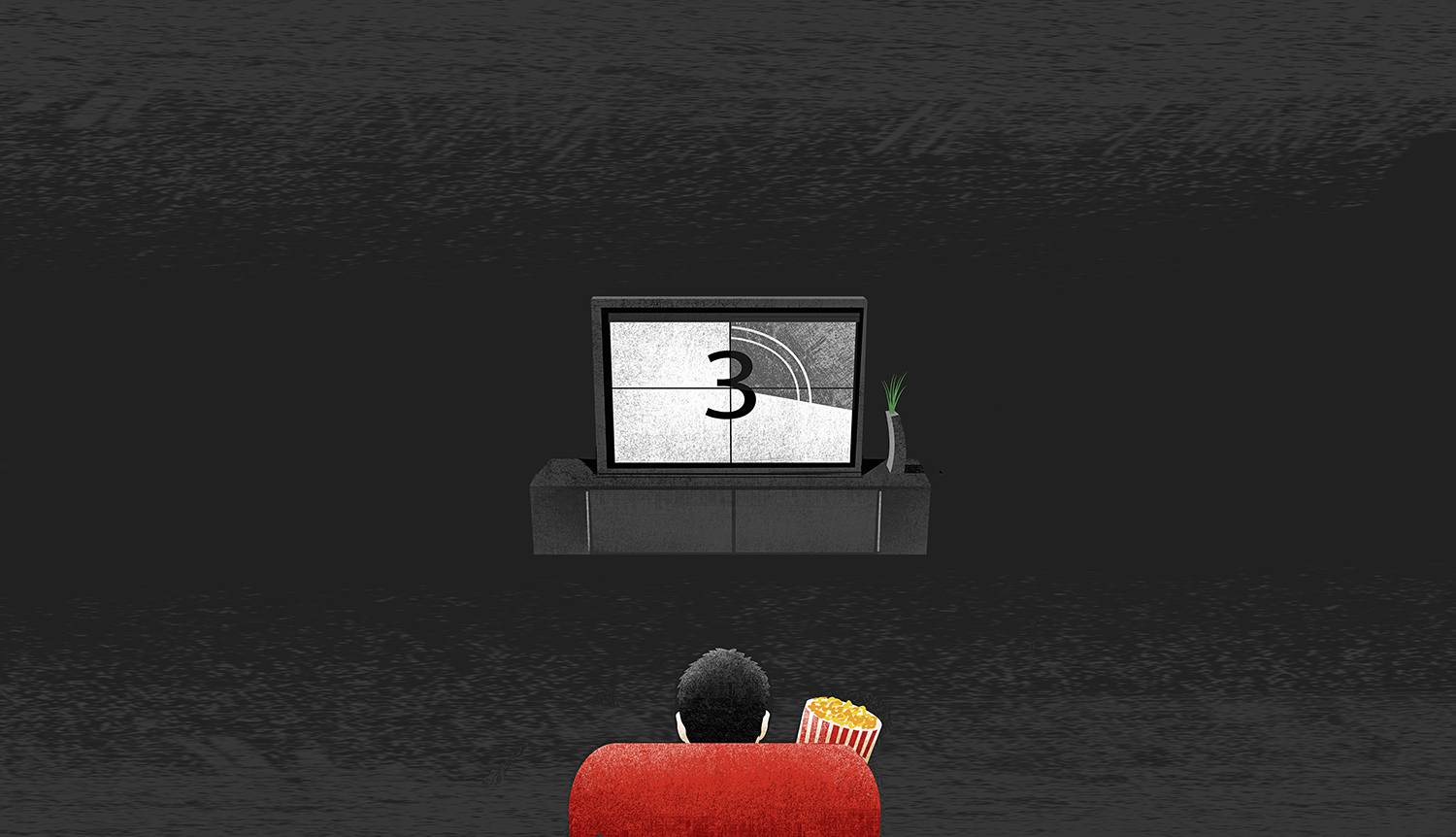The unexpected social benefits of binge-watching TV by yourself
When I moved to a new city where I didn't know anyone, I watched TV to pass the time — and discovered a new way to make connections


A free daily email with the biggest news stories of the day – and the best features from TheWeek.com
You are now subscribed
Your newsletter sign-up was successful
A year ago, I had never watched 30 Rock. I had never seen the high school football team take the field in Dillon, Texas. I had no opinion on whether Ross and Rachel were really on a break.
What I did know was this: I had just moved to New York City, where I didn't know anyone. My family lived in the opposite corner of the U.S., 2,500 miles away, and my friends were spread out across the country.
With no social connections in the city, how did I decide to pass the time? By doing something that's generally considered the pinnacle of anti-social: binge-watching all the TV shows I had neglected to consume for all these years.
The Week
Escape your echo chamber. Get the facts behind the news, plus analysis from multiple perspectives.

Sign up for The Week's Free Newsletters
From our morning news briefing to a weekly Good News Newsletter, get the best of The Week delivered directly to your inbox.
From our morning news briefing to a weekly Good News Newsletter, get the best of The Week delivered directly to your inbox.
And to my great surprise, it turned out that TV wasn't an impediment to my social problem. It was the solution.
It wasn't always like this. For decades, TV was demonized as an "idiot box" — a scourge that destroyed children's minds and replaced the family dinner table with a couch in front of a glowing screen. Sure, friends would get together to watch certain cult TV shows, and coworkers would discuss big episodes around the water cooler. But social TV watching has never been bigger or better than it is now. It's not just the quality of TV that has improved. It's the way we watch it, and the unexpected connections it allows us to make.
For me, it started while I was scrolling Netflix on a boring night in during my first few months in New York. I came across 30 Rock, which a friend in Chicago had been trying to sell me on for years. I finally heeded her advice — and ended up texting her during nearly every episode. Thanks to Netflix's on-demand nature, I could pause, rewind, and record my favorite clips — my own personal GIF-factory — and excitedly send them to her so she could re-live the moments with me. It was a new bond with an old friend who was miles and miles away.
The trend continued. My college apartment had housed three complete DVD sets of Friends, but I managed to get through my senior year having seen not even half the series. When I finally watched all 10 seasons, I was somehow bonding even further with people next to whom I'd spent months brushing my teeth. I now understood the plethora of listicles that promise to enlighten you via Friends jokes, and shared them with my former roommates on Facebook and Google Hangouts. There were six of us total, so thanks to Face in Hole, we each claimed a Central Perk regular as our own (luckily, I successfully lobbied against being Ross).
A free daily email with the biggest news stories of the day – and the best features from TheWeek.com
I joined the Taylor family from Friday Night Lights for weeknight dinners — even if I was personally cooking for one. And when I messaged some old college friends to tell them I was finally watching the show, they wanted to experience it with me. We started a Facebook group chat titled "FRIDAY NIGHT LIGHTS CLUB," and each controversial development gave me an excuse to talk to them, saving us from the otherwise all-too-easy fate of going days, then weeks, then months without connecting. A fictional town in rural Texas was serving admirably as a bridge between North Carolina, Illinois, and New York.
And it wasn't long before my binge-watching wasn't just creating bridges to my old friends — it was helping me make new ones. Via Hulu, I watched two seasons of Starz's underrated comedy Party Down in just a few days, which enabled me to turn around and discuss the entire show with the coworkers who had recently declared themselves superfans.
There's a certain advantage to watching shows that have already ended. People who have already watched them know what happens, what I haven't yet seen, and are excited for me to be in on the jokes or to be horrified by the twists. They're getting re-invested in the show just as I'm getting invested, waiting with bated breath for me to get to a certain plot point that took their breath away when they watched it. They're waiting for me to hear the punch line that made them laugh out loud. There's no spoiler alert-ing or unknown endings — the critiques have been written, the accolades have faded — and all that's left to bring the show to life again is me, my friends who've watched it, and our passionate conversations about it.
Millennials tend to be social in most things — including their consumption of entertainment. Back in November, Alana Semuels wrote in The Atlantic about a new housing concept called Commonspace, which features individual micro-units attached to larger common areas. "Millennials... want the chance to be alone in their own bedrooms, bathrooms, and kitchens, but they also want to be social and never lonely," Semuels wrote. In the days after I moved to New York, I could relate, as I sat in my apartment, basking in my independence and freedom, but craving that cozy feeling of crowding onto a couch with your buds.
And that's where the unexpected combination of technology and modern television came in. Thanks to pause-at-will streaming services and myriad messaging options, I could react in real time to on-screen developments. I could stream shows on my computer, record the jokes on my phone, and iMessage them to my friends. I could pause Netflix to send a shocked Facebook message. I could race against Hulu's commercials to fire off a properly frantic text before the show resumed. Through mini keyboards and glowing screens, I could send the equivalent of a surprised gasp or excited slap on the shoulder. More recently, I've even begun syncing streaming services with a friend in the Midwest: We each hit play on new episodes of shows so that we're watching "together," several states apart.
Today, it's often argued that technology is driving us further apart as we bury ourselves in omnipresent screens of varying size. But when you're already far apart from your friends, it turns out that the intersection of technology and entertainment can be invaluable in bridging that gap. Each new show I watch brings me more than idle entertainment. It results in a new connection.
Kimberly Alters is the news editor at TheWeek.com. She is a graduate of the Medill School of Journalism at Northwestern University.
-
 Switzerland could vote to cap its population
Switzerland could vote to cap its populationUnder the Radar Swiss People’s Party proposes referendum on radical anti-immigration measure to limit residents to 10 million
-
 Political cartoons for February 15
Political cartoons for February 15Cartoons Sunday's political cartoons include political ventriloquism, Europe in the middle, and more
-
 The broken water companies failing England and Wales
The broken water companies failing England and WalesExplainer With rising bills, deteriorating river health and a lack of investment, regulators face an uphill battle to stabilise the industry
-
 Walter Isaacson's 'Elon Musk' can 'scarcely contain its subject'
Walter Isaacson's 'Elon Musk' can 'scarcely contain its subject'The latest biography on the elusive tech mogul is causing a stir among critics
-
 Welcome to the new TheWeek.com!
Welcome to the new TheWeek.com!The Explainer Please allow us to reintroduce ourselves
-
 The Oscars finale was a heartless disaster
The Oscars finale was a heartless disasterThe Explainer A calculated attempt at emotional manipulation goes very wrong
-
 Most awkward awards show ever?
Most awkward awards show ever?The Explainer The best, worst, and most shocking moments from a chaotic Golden Globes
-
 The possible silver lining to the Warner Bros. deal
The possible silver lining to the Warner Bros. dealThe Explainer Could what's terrible for theaters be good for creators?
-
 Jeffrey Wright is the new 'narrator voice'
Jeffrey Wright is the new 'narrator voice'The Explainer Move over, Sam Elliott and Morgan Freeman
-
 This week's literary events are the biggest award shows of 2020
This week's literary events are the biggest award shows of 2020feature So long, Oscar. Hello, Booker.
-
 What She Dies Tomorrow can teach us about our unshakable obsession with mortality
What She Dies Tomorrow can teach us about our unshakable obsession with mortalityThe Explainer This film isn't about the pandemic. But it can help viewers confront their fears about death.
